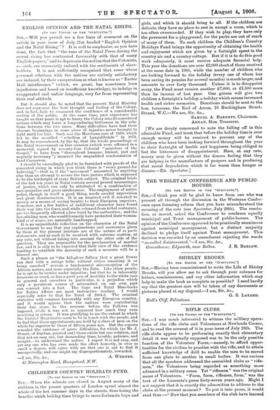ENGLISH OPINION AND THE NATAL RISING. [To TO IC EDITOR
OF TDB "SPECTATOR."] SIR,—Will you permit me a few lines of comment on the
article in your issue of July 21st headed "English Opinion and the Natal Rising " ? It is well to emphasise, as you have done, the fact that "the tone of the Natal Press during the recent rising has contrasted favourably with that of many English papers," and to deprecate the notion that the Colonists, as such, are necessarily imbued with the sentiments of slave- holders. It is not sufficiently recognised that some whose personal relations with the natives are entirely satisfactory are induced, by their exasperation at what is known as "Exeter Hall interference" (which, we grant, has sometimes been injudicious and based on insufficient knowledge), to indulge in exaggerated and unfair language, very far from representing their real attitude.
But it should also be noted that the present Natal Ministry does not represent the best thought and feeling of the Colony,
and, in fact, fails to command the confidence of a considerable
section of the public. At the same time, past experience has taught us that panic is apt to hurry the Colony into ill-considered
actions which may leave a long-enduring bitterness in the rela-
tions between the two races. Many difficulties have had their obscure beginnings in some piece of injustice never brought to
light until too late. Such was the Matsbana ease of 1858, which led to the so-called "rebellion of Langalibalele " in 1873. It may be remembered, by the by, that the whole proceedings of the Natal Government on this occasion (which were affirmed in a memorial, signed by seventy-four Colonial "ministers of the Gospel," to have been "throughout humane, lenient, just and urgently necessary") incurred the unqualified condemnation of Lord Carnarvon.
I should be exceedingly glad to be furnished with proofs of the concerted rising in which you think there is "every ground for believing,"—that is, if the " movement " amounted to anything else than an attempt to secure the bare justice which is supposed to be the birthright of every British subject. The criminal trials of the last ten years in Natal contain several proved miscarriages of justice, which can only be attributed to a combination of race-prejudice and gross carelessness. The employment of native police, though in itself a good thing, needs careful supervision and great discrimination. It is an unmixed evil if resorted to merely as a means of saving trouble to their European superiors. Somehow, not a few bullies of indifferent character have found their way into the force, and, while released from tribal restraints, are too frequently allowed a free hand by the authorities ; and the law-abiding men, who would formerly have protected their woman- kind vi et armis, are naturally handicapped.
It is no unjustifiable reflection on the character of the Natal Government to say that any explanations and assurances given by them at the present juncture are of the nature of ex parts statements, and as such to be received with extreme caution, at any rate, not without taking into account the other side of the question. They are responsible for the proclamation of martial law, and it is only to be expected that their view of the evidence tending to establish the necessity of such a measure will be a biassed one.
Such a phrase as "the kid-glove fallacy that a great Power can deal with a savage tribe without either smashing it or being smashed" reveals a fundamental misconception of the African native, and more especially the Zulu. Like other people, he is apt to be restive under injustice; but that he is inherently ferocious or cruel, or has a part pris of hostility to the white race in general and ourselves in particular, is a prejudice which only a persistent course of misconduct on our own part can convert into a fact. The Cape and Natal Blue-books for Native Affairs are most instructive reading. I would especially refer to that for Natal of 1904-5. The criminal statistics will compare favourably with any European country, and it would appear that the natives were contributing their fair share to the revenue before the Poll-tax was imposed, while it was not so apparent how much they were receiving in return. It was gratifying to see the extent to which the District Magistrates seem to be in touch with the people, and to find that these appointments are held by a class of men on the whole far superior to those of fifteen years ago. But the reports revealed the existence of grave difficulties, for which (as Mr. J. Stuart, of Durban, pointed out) there exists but one solution, and that not an easy one, but demanding time, trouble, patience, and insight,—to understand the native. I regret it is not easy, and yet any one who has ever made the effort honestly, in ever so small a degree, will agree with me that one is apt to find it unexpectedly, and one might say disproportionately, rewarded.
43 Nassington _Road, Hampstead, N.W.






































 Previous page
Previous page